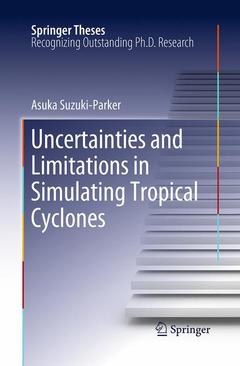Description
Uncertainties and Limitations in Simulating Tropical Cyclones, Softcover reprint of the original 1st ed. 2012
Springer Theses Series
Author: Suzuki-Parker Asuka
Language: English
Subjects for Uncertainties and Limitations in Simulating Tropical...:
105.49 €
In Print (Delivery period: 15 days).
Add to cart
Uncertainties and Limitations in Simulating Tropical Cyclones
Publication date: 08-2016
Support: Print on demand
Publication date: 08-2016
Support: Print on demand
Approximative price 105.49 €
In Print (Delivery period: 15 days).
Add to cart
An assessment of uncertainties and limitations in simulating tropical cyclone climatology and future
Publication date: 01-2012
78 p. · 15.5x23.5 cm · Paperback
Publication date: 01-2012
78 p. · 15.5x23.5 cm · Paperback
Description
/li>Contents
/li>Comment
/li>
The thesis work was in two major parts: development and testing of a new approach to detecting and
tracking tropical cyclones in climate models; and application of an extreme value statistical approach to
enable assessment of changes in weather extremes from climate models.
The tracking algorithm applied a creative phase-space approach to differentiate between modeled tropical
cyclones and their mid-latitude cousins. A feature here was the careful attention to sensitivity to choice of
selection parameters, which is considerable. The major finding was that the changes over time were
relatively insensitive to these details. This new approach will improve and add confidence to future
assessments of climate impacts on hurricanes.
The extremes approach utilized the Generalized Pareto Distribution (one of the standard approaches to
statistics of extremes) applied to present and future hurricane distributions as modeled by a regional
climate model, then applied the changes to current observations to extract the changes in the extremes.
Since climate models cannot resolve these extremes directly, this provides an excellent method of
determining weather extremes in general. This is of considerable societal importance as we are most
vulnerable to such extremes and knowledge of their changes enables improved planning and adaptation
strategies.
tracking tropical cyclones in climate models; and application of an extreme value statistical approach to
enable assessment of changes in weather extremes from climate models.
The tracking algorithm applied a creative phase-space approach to differentiate between modeled tropical
cyclones and their mid-latitude cousins. A feature here was the careful attention to sensitivity to choice of
selection parameters, which is considerable. The major finding was that the changes over time were
relatively insensitive to these details. This new approach will improve and add confidence to future
assessments of climate impacts on hurricanes.
The extremes approach utilized the Generalized Pareto Distribution (one of the standard approaches to
statistics of extremes) applied to present and future hurricane distributions as modeled by a regional
climate model, then applied the changes to current observations to extract the changes in the extremes.
Since climate models cannot resolve these extremes directly, this provides an excellent method of
determining weather extremes in general. This is of considerable societal importance as we are most
vulnerable to such extremes and knowledge of their changes enables improved planning and adaptation
strategies.
Introduction.- Tropical cyclone detection and tracking method.- Simulated tropical cyclone climatology in the tropical channel experiment.- North Atlantic hurricane climate change experiment.- Statistical modeling of tropical cyclone intensity.- Concluding remarks.
Nominated by the Georgia Univesity of Technology for a Springer Theses Prize This work investigates how tropical cyclone intensity will change over the next 50 years - a question of high interest to industrial and governmental communities New approach to asses weather extremes in climate models and current observations Includes supplementary material: sn.pub/extras
© 2024 LAVOISIER S.A.S.
These books may interest you

Hurricane Risk 137.14 €



